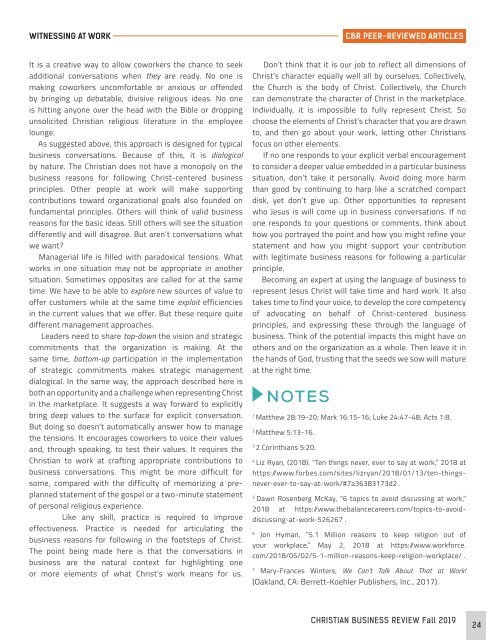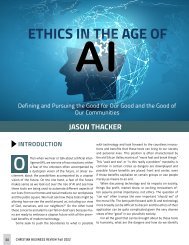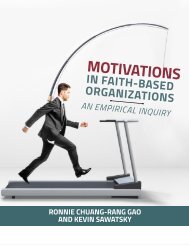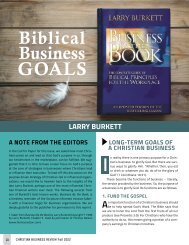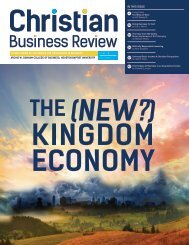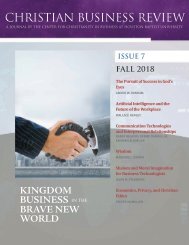Christian Business Review 2019: Workplace Practices That Glorify God (Issue 8)
Create successful ePaper yourself
Turn your PDF publications into a flip-book with our unique Google optimized e-Paper software.
WITNESSING AT WORK<br />
CBR PEER-REVIEWED ARTICLES<br />
It is a creative way to allow coworkers the chance to seek<br />
additional conversations when they are ready. No one is<br />
making coworkers uncomfortable or anxious or offended<br />
by bringing up debatable, divisive religious ideas. No one<br />
is hitting anyone over the head with the Bible or dropping<br />
unsolicited <strong>Christian</strong> religious literature in the employee<br />
lounge.<br />
As suggested above, this approach is designed for typical<br />
business conversations. Because of this, it is dialogical<br />
by nature. The <strong>Christian</strong> does not have a monopoly on the<br />
business reasons for following Christ-centered business<br />
principles. Other people at work will make supporting<br />
contributions toward organizational goals also founded on<br />
fundamental principles. Others will think of valid business<br />
reasons for the basic ideas. Still others will see the situation<br />
differently and will disagree. But aren’t conversations what<br />
we want?<br />
Managerial life is filled with paradoxical tensions. What<br />
works in one situation may not be appropriate in another<br />
situation. Sometimes opposites are called for at the same<br />
time. We have to be able to explore new sources of value to<br />
offer customers while at the same time exploit efficiencies<br />
in the current values that we offer. But these require quite<br />
different management approaches.<br />
Leaders need to share top-down the vision and strategic<br />
commitments that the organization is making. At the<br />
same time, bottom-up participation in the implementation<br />
of strategic commitments makes strategic management<br />
dialogical. In the same way, the approach described here is<br />
both an opportunity and a challenge when representing Christ<br />
in the marketplace. It suggests a way forward to explicitly<br />
bring deep values to the surface for explicit conversation.<br />
But doing so doesn’t automatically answer how to manage<br />
the tensions. It encourages coworkers to voice their values<br />
and, through speaking, to test their values. It requires the<br />
<strong>Christian</strong> to work at crafting appropriate contributions to<br />
business conversations. This might be more difficult for<br />
some, compared with the difficulty of memorizing a preplanned<br />
statement of the gospel or a two-minute statement<br />
of personal religious experience.<br />
Like any skill, practice is required to improve<br />
effectiveness. Practice is needed for articulating the<br />
business reasons for following in the footsteps of Christ.<br />
The point being made here is that the conversations in<br />
business are the natural context for highlighting one<br />
or more elements of what Christ’s work means for us.<br />
Don’t think that it is our job to reflect all dimensions of<br />
Christ’s character equally well all by ourselves. Collectively,<br />
the Church is the body of Christ. Collectively, the Church<br />
can demonstrate the character of Christ in the marketplace.<br />
Individually, it is impossible to fully represent Christ. So<br />
choose the elements of Christ’s character that you are drawn<br />
to, and then go about your work, letting other <strong>Christian</strong>s<br />
focus on other elements.<br />
If no one responds to your explicit verbal encouragement<br />
to consider a deeper value embedded in a particular business<br />
situation, don’t take it personally. Avoid doing more harm<br />
than good by continuing to harp like a scratched compact<br />
disk, yet don’t give up. Other opportunities to represent<br />
who Jesus is will come up in business conversations. If no<br />
one responds to your questions or comments, think about<br />
how you portrayed the point and how you might refine your<br />
statement and how you might support your contribution<br />
with legitimate business reasons for following a particular<br />
principle.<br />
Becoming an expert at using the language of business to<br />
represent Jesus Christ will take time and hard work. It also<br />
takes time to find your voice, to develop the core competency<br />
of advocating on behalf of Christ-centered business<br />
principles, and expressing these through the language of<br />
business. Think of the potential impacts this might have on<br />
others and on the organization as a whole. Then leave it in<br />
the hands of <strong>God</strong>, trusting that the seeds we sow will mature<br />
at the right time.<br />
NOTES<br />
1<br />
Matthew 28:19-20; Mark 16:15-16; Luke 24:47-48; Acts 1:8.<br />
2<br />
Matthew 5:13-16.<br />
3<br />
2 Corinthians 5:20.<br />
4<br />
Liz Ryan, (2018). “Ten things never, ever to say at work,” 2018 at<br />
https://www.forbes.com/sites/lizryan/2018/01/13/ten-thingsnever-ever-to-say-at-work/#7a36383173d2<br />
.<br />
5<br />
Dawn Rosenberg McKay, “6 topics to avoid discussing at work,”<br />
2018 at https: /www.thebalancecareers.com/topics-to-avoiddiscussing-at-work-526267<br />
.<br />
6<br />
Jon Hyman, “5.1 Million reasons to keep religion out of<br />
your workplace,” May 2, 2018 at https: /www.workforce.<br />
com/2018/05/02/5-1-million-reasons-keep-religion-workplace/ .<br />
7<br />
Mary-Frances Winters, We Can’t Talk About <strong>That</strong> at Work!<br />
(Oakland, CA: Berrett-Koehler Publishers, Inc., 2017).<br />
CHRISTIAN BUSINESS REVIEW Fall <strong>2019</strong><br />
24 2


